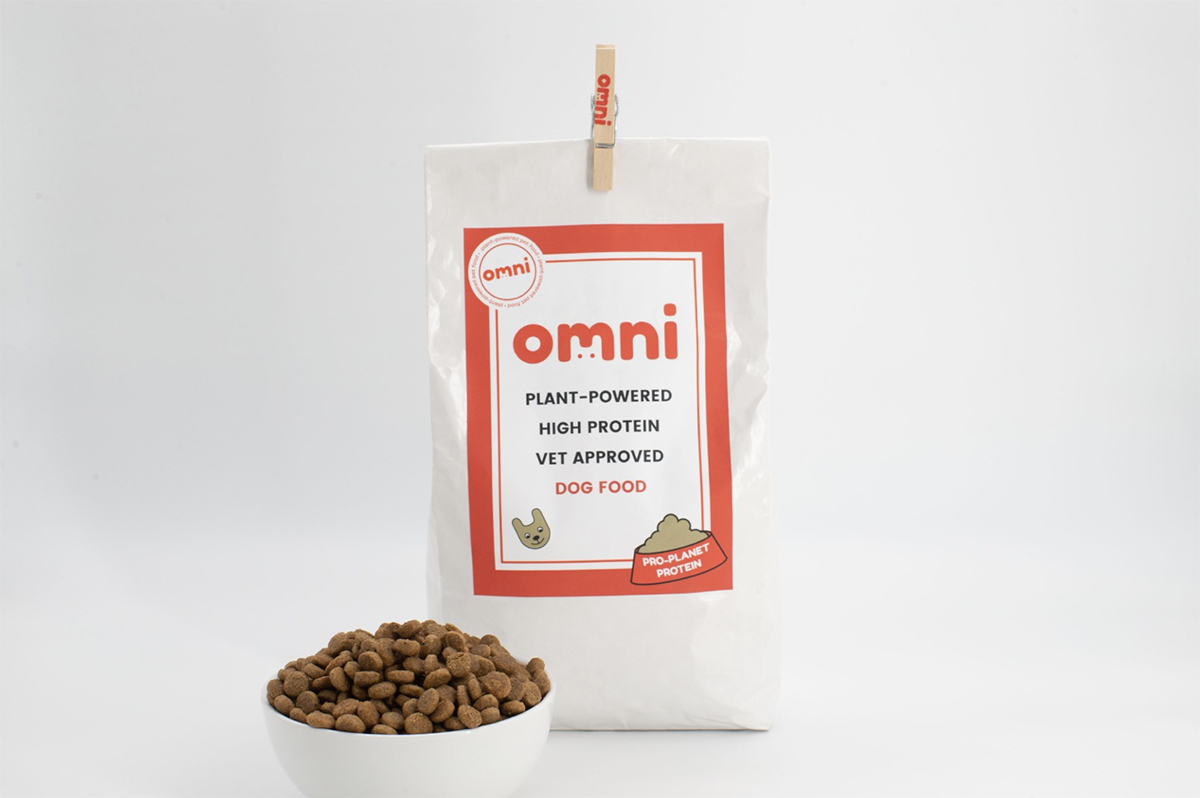April 19, 2022
Madaline Dunn talked to Dr. Guy Sandelowsky about his company OMNI, a plant-based dog food brand that's using pulses to make dogs healthy and the planet greener.


Thanks to Mintel research, we know that 34% of UK dog owners are actively looking to feed their dogs plant-based meals - but many struggle to get the balance of nutrients that dogs need right. This is no easy task, especially with home cooking, which is becoming increasingly popular. We created OMNI so that there was a credible and trusted option, formulated by vets to be nutritionally balanced and complete and with the highest quality ingredients and safety standards. We believe that switching out certain animal-derived ingredients like processed meat and lard for plant-based ones can potentially confer real health benefits for dogs. Not only that, plant-based diets like OMNI can also be up to 90% more environmentally sustainable in terms of land, water and CO2 emissions.
With regards to Shiv, he'd always been in the investment banking space and had seen lots of industries transform to become healthier and more sustainable, whether that was plant-based milk, meat, or eco-friendly washing products, but the one category he thought was a bit stuck was the dog food sector, which was still heavily reliant on meat. Shiv is from Sri Lanka and his family all eat plant-based diets and had dogs who were living to between 14 and 16 years eating the same diets as their caregivers. They were living really long lives, having never eaten meat. When Shiv came to the West, he discovered that the average life expectancy of dogs in the UK is just over 11-years-old. He was baffled, and thought maybe it was down to nutrition. So, we came together and it's all evolved from there.
We're a Covid business through and through. I didn't meet Shiv in person for the first six months of the business due to restrictions - and you're right, pet ownership went through the roof during that time. A lot of people were spending more time at home with their families and reassessing what really mattered to them. A big part of that was people realizing that they wanted a dog.
There seemed to be renewed attention on health during the pandemic. People became much more conscious of what they were eating and what they were feeding their dogs. More broadly, the pandemic was a great time for reflection and allowed many people to look at our relationship with the planet and find ways to become more eco-aware. These factors were really strong tailwinds for us because our products are made with healthy ingredients and, compared to some of the meat products out there, our pet food is more environmentally sustainable too. All in all, it was good timing and we learned how to run the business remotely.
One of the most important nutrients for dogs is protein, but there's a misconception that this protein has to come from meat - in fact, there is no evidence that dogs need to eat meat. At the end of the day, dogs need nutrients, not ingredients, and I think that's something that people are starting to learn now. Some companies are providing protein to dogs using insects but you can also do this by feeding them plants.
Proteins are built of building blocks called amino acids and there have been studies that have looked at what kind of amino acids dogs require and what levels they need. As a result, we have guidelines from regulatory bodies, detailing exactly what needs to be included for a nutritionally complete diet.
That was a starting point for us. We ended up developing a proprietary protein blend including soya, potato protein, lentils, peas, microalgae, and yeast. It was a very intentional combination and one that is quite unique. If you look at some of the other alternative dog foods, often they use just one or two hero protein sources. These dog foods may have enough protein to meet the 18% minimum requirement, but it's critical to ensure they have the essential amino acids too. We batch-test our products in collaboration with Nottingham Vet School to check these sorts of things and ensure that our recipes meet nutritional guidelines. It's something we're really proud of and it's a differentiator. Our products also have more protein than many meat-based dry foods on the market, at a 30% inclusion rate in our OMNI adult recipe.
We know that a lot of dogs have food allergies or intolerances, which are commonly triggered by animal-derived proteins. Beef, chicken and dairy are some common ones, and though plant-based ingredients can be culprits too, they tend to cause clinical signs less commonly. Allergies can cause everything from itchy skin and sore ears to hair loss and gastrointestinal upsets (diarrhea, vomiting, etc.). By using pulses in dog food, you're offering dogs a novel protein source, and hopefully improving the chances of their bodies being more receptive to these ingredients.
The other thing that people don't realize is that pulses aren't just a great source of protein, they're also packed full of micronutrients. So, it's a case of two for the price of one - you're getting both protein and lots of other components that dogs need to thrive, too.

Pulses in their natural form tend to be high in fiber, and if you don't get the right balance, too much fiber can actually bind micronutrients. You might have the right minerals and vitamins on paper, but they may not be bioavailable to dogs. So to address this, we also use protein isolates. This way, we're able to utilize the best part of the pulse without increasing the fiber content too much so that it becomes indigestible or binds those micronutrients. Overall, our average fiber content is 3%, which is on par with the average dry meat-based dog food products on the market.
Initially, many of our customers were vegetarians or vegans who felt uncomfortable with meat and animal products in their households. OMNI gave them a way to feed their dogs a trusted nutritionally complete diet, that their dogs love eating, all without meat. That said, what we've found over the last few months is that now half of our customers are not necessarily vegan or veggie, but flexitarians. We have customers who want to reduce their meat intake for health and environmental reasons. They use our products for meat-free lunches or as a mixer with meat, and we support that because we think every little helps to bring the goodness of plants into dog diets and reduce the carbon footprint of a meal. There's data to show that owning a medium-size dog is the equivalent, in terms of carbon footprint, to owning a Landcruiser SUV - a lot of this comes from meat in the diet.
We've got quite a lot of research going on at the moment, but that particular job role we're recruiting for came about because we'd been getting lots of candid feedback from our customers saying that their dogs' stool didn't smell anymore and they were easier to pick up on walks. So, we decided to track it and be analytical. We thought, "What better way to learn more than to ask owners who are feeding their dogs a meat-based diet to change to OMNI and then document the general health changes they see." That application process will be closing in April, and we've had an overwhelmingly high number of applicants with lots of people trying to get involved, which is fantastic.

The other research we're doing is looking into the microbiome effect of a plant-based diet on dogs. This involves analyzing dog stools to see how feeding a plant-based diet affects the balance of healthy bacteria in the gut. That's a really interesting area of research at the moment that could have lots of clinical applications in the future for dogs with various health problems.
We're also doing digestibility studies on our food, and should have those results in the next few months.
We just closed our first funding round and are really grateful to have the support of some really great people. Brendan Robinson, who founded Village Vet, came on board really early on. Village Vet is a gold-standard state-of-the-art vet clinic group in the UK and to have Brendan's backing, who is a vet himself, sent a strong message of credibility and trustworthiness to the veterinary community. We also have investors from the cultivated meat space supporting us too because one day, we may be able to work together to launch cultivated meat products for the cat food market. Proveg International really catapulted us through the process and a few other VC funds.
This round of funding is all about market education. A lot of people want to feed their dogs better and reduce their carbon footprint but they don't really know that dogs can thrive eating plant-based foods. We're also using some of this funding for our research and in the future, we'll be looking to raise again to help us scale our product range and internationalize.
So, while it's been great, we need to put the capital into motion and deliver results.
Yes, we're developing a functional treat range at the moment. Some of the popular treats on the market have up to 60% fat but we've tried to keep ours down to less than 10%, so it'll be less of a 'guilt treat' for owners. We've also fortified them with certain nutraceuticals that have, at least anecdotally, been recorded to help with various health issues. We've got a joint treat that has a vegan glucosamine component to help support dogs' joints, we've got one for supporting dogs with anxiety, one for sensitive stomachs, one for skin/coat troubles with all the omegas and chia seeds to fortify the skin barrier function and a puppy training treat.
We plan to have those ready in the next two to three months. They'll initially be released as a limited edition range and then, if they do well, we'll be rolling them out at scale.
Pulses are going to be even more important as time goes on. We're already seeing a lot of household pet food brands bring out plant-based ranges that use pulses, including Lily's Kitchen, Butternut Box, Barking Heads, etc.
I think people are just starting to appreciate the power of pulses, and I predict that they're only going to grow in popularity.
Disclaimer: The opinions or views expressed in this publication are those of the authors or quoted persons. They do not purport to reflect the opinions or views of the Global Pulse Confederation or its members.